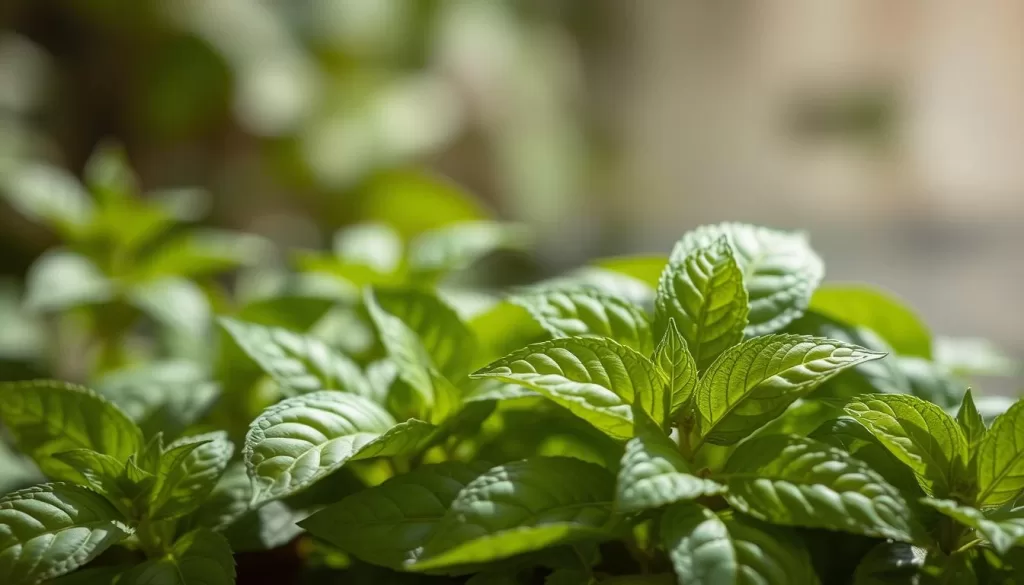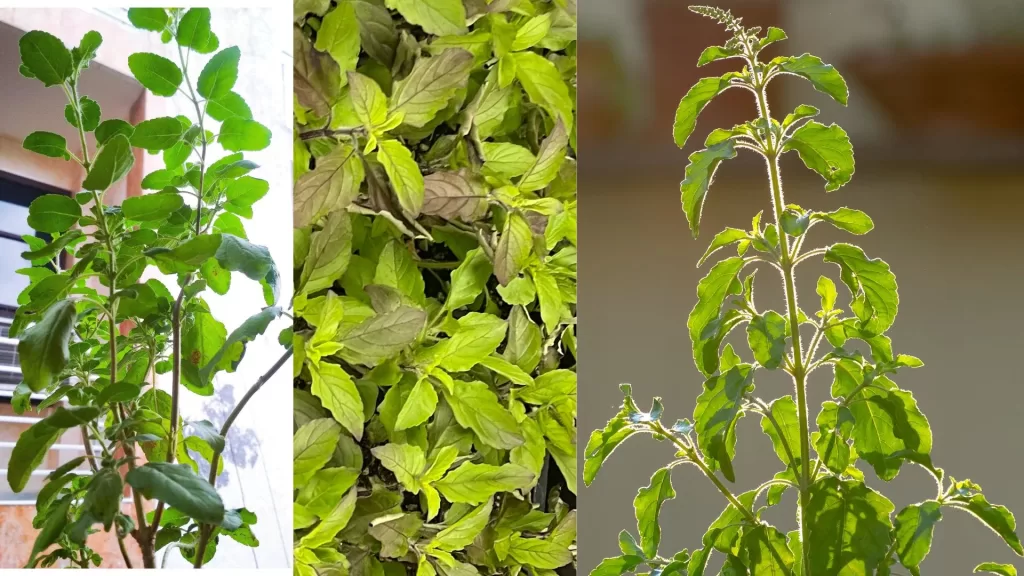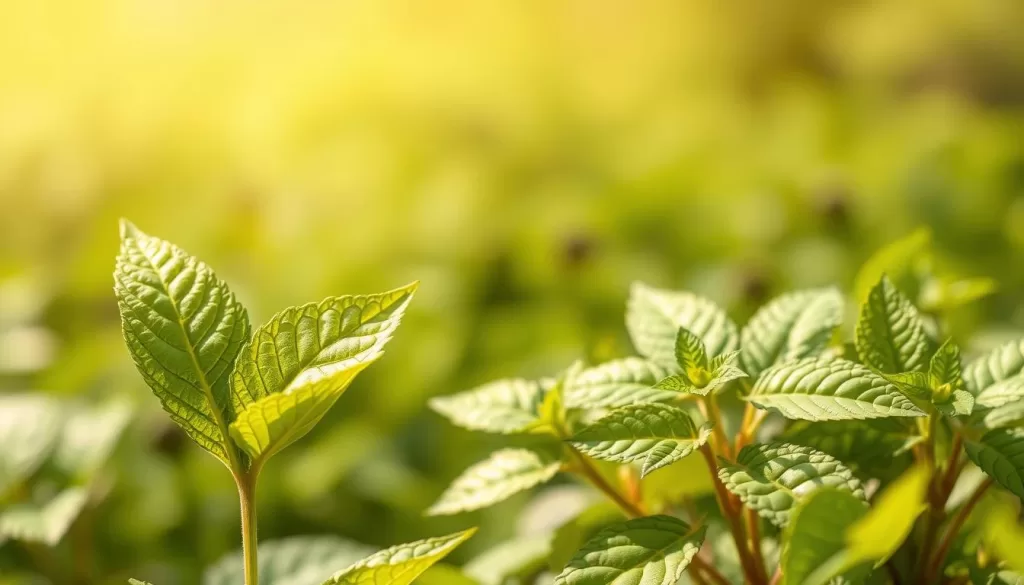Did you know that traditional medicine has been using tulsi leaves, often called holy basil, for centuries? They improve general health and well-being. This beloved herb is a mainstay in many Indian homes and is becoming more well-known globally due to its exceptional health advantages. As a Medical expert today, I am going to write a helpful article about what are the benefits of tulsi leaves.

Including tulsi in your everyday routine might have a big effect on your health. It may boost your immune system and lessen stress and anxiety. There are several benefits of eating tulsi leaves.
🌿 Key Takeaways: Benefits of Tulsi Leaves
- Boosts Immunity: Tulsi is rich in antioxidants and helps strengthen the immune system naturally.
- Fights Infections: Known for its antibacterial, antiviral, and antifungal properties.
- Reduces Stress: Acts as a natural adaptogen, helping the body manage stress and anxiety.
- Supports Respiratory Health: Provides relief from cough, cold, asthma, and bronchitis.
- Improves Digestion: Aids in digestive processes and helps relieve bloating and indigestion.
- Regulates Blood Sugar: May help in managing blood glucose levels, beneficial for diabetics.
- Promotes Heart Health: Supports healthy cholesterol levels and blood pressure regulation.
- Skin & Hair Benefits: Helps clear acne, skin infections, and supports a healthy scalp.
- Detoxifies the Body: Acts as a natural detoxifier and blood purifier.
- Enhances Mental Clarity: Improves focus, memory, and overall brain function.
An Introduction: The benefits of Tulsi leaves
One of the most beloved plants in Ayurvedic treatment and conventional Indian homes is tulsi, often called Holy Basil. Often called the “Queen of Herbs,” tulsi is honored for its strong health advantages in addition to its spiritual value. Rich in antioxidants, vitamins A and C, calcium, zinc, and iron, tulsi leaves are very important for general health.
Tulsi has been used historically to treat common illnesses, increase immunity, and lower stress. Its antibacterial, antiviral, and antifungal qualities make it a natural cure for colds, coughs, and respiratory disorders. It’s also believed to boost heart health, control blood sugar levels, and assist digestion.
What makes tulsi so unique is its adaptogenic nature – helping the body handle stress and preserve equilibrium. Whether ingested as fresh leaves, herbal tea, or supplements, tulsi provides a comprehensive approach to health.
In today’s environment, when people are seeking more natural and preventative healthcare treatments, tulsi leaves stand out as a time-tested herb with current relevance. Understanding the advantages of tulsi leaves may encourage better lifestyle choices and a greater appreciation for nature’s healing power.
Understanding Tulsi: The Queen of Herbs
Holy basil, another name for the Tulsi plant, is more than simply a herb. It has a wealth of cultural heritage and health advantages. It has been an essential component of Ayurvedic treatment for millennia. The queen of herbs originates from Southeast Asia and the Indian subcontinent. Its benefits extend beyond health. It has strong roots in cultural and spiritual customs all throughout the globe.

What is Tulsi, and Where Does It Come From?
Tulsi, also known as Ocimum sanctum, is a perennial plant that belongs to the Lamiaceae family of mints. It thrives in warm regions and requires little maintenance; its leaves are fuzzy and green, and it produces purple or green flowers.
Tulsi is considered a holy plant in Hinduism and is often seen in temple grounds and households.
Tulsi, which has its origins in India, has been used for thousands of years in traditional medicine. Its propensity to flourish has led to its expansion around the globe, and now, it is prized for its spiritual and physiological advantages.
Different Varieties of Tulsi Plants
There are many types of tulsi, each with its own benefits. The most well-known include:

- Ram Tulsi: Known for its spiritual value and used in religious rituals.
- Shyam Tulsi: Has dark purple leaves and is thought to have stronger medicinal properties.
- Vana Tulsi: A wild type, used in herbal remedies and believed to be more potent.
- Kapoor Tulsi: Has light green leaves and is often used in Ayurvedic medicine.
Knowing about these varieties helps you pick the best tulsi for your health needs and preferences.
The Sacred History of Tulsi in Traditional Medicine
For ages, Tulsi has played a significant role in Indian culture. Its extensive history in traditional medicine is shown by its status as a holy plant in Ayurveda.
Origins and Cultural Significance in Ayurveda
In Hinduism, tulsi, also known as Ocimum sanctum, is a holy herb that is often planted in homes and temples. In Ayurveda, tulsi is seen as a link between the material and spiritual realms.
It is utilized to balance the body’s energy in Ayurvedic therapies, which aids in fostering general wellbeing.
Key aspects of tulsi’s cultural significance include:
- Temples and residences that practice ritualistic worship and cultivation
- Traditional Ayurvedic medicine uses it for its therapeutic qualities.
- Symbolism for spiritual regeneration and development
Traditional Uses Across Ancient Civilizations
The medicinal advantages of tulsi were known outside of India; ancient societies employed it to cure skin conditions and respiratory disorders.
Some traditional uses of tulsi across different cultures include:
- Respiratory relief: Tulsi leaves were traditionally used for respiratory treatment, including coughs, colds, and bronchitis.
- Skin health: Tulsi was used topically to cure skin infections, reduce inflammation, and mend wounds.
- Stress relief: Tulsi was ingested as an infusion or tea to ease tension and encourage calmness.
Tulsi’s many uses and adaptability demonstrate its significance in traditional medicine, and its revered heritage continues to be important now, assisting us in comprehending health and well-being.
Tulsi Leaves Nutritional Value Per 100g
Here’s a table showing the nutritional value of Tulsi (Holy Basil) leaves per 100 grams:
| Nutrient | Amount per 100g | Health Benefits |
| Calories | 22 kcal | Low in calories; ideal for daily use |
| Carbohydrates | 2.7 g | Provides quick energy |
| Protein | 3.2 g | Supports tissue repair and muscle health |
| Fat | 0.6 g | Very low fat content |
| Fiber | 1.6 g | Aids digestion and promotes gut health |
| Vitamin A | 5275 IU | Essential for eye health and immune function |
| Vitamin C | 18 mg | Boosts immunity and skin health |
| Vitamin K | 414.8 mcg | Important for blood clotting and bone health |
| Calcium | 177 mg | Strengthens bones and teeth |
| Iron | 3.2 mg | Vital for oxygen transport in the blood |
| Magnesium | 64 mg | Supports muscle and nerve function |
| Potassium | 295 mg | Maintains fluid balance and supports heart health |
| Phosphorus | 56 mg | Essential for healthy bones and energy production |
| Zinc | 0.8 mg | Supports immune system and wound healing |
Note: Nutritional values may vary slightly based on growing conditions and variety.
What Are the Health Benefits of Tulsi Leaves?
What are the benefits of tulsi leaves? Rich in nutrients and bioactive components, tulsi leaves have long been used in traditional medicine, particularly in Ayurveda. Known for its adaptogenic qualities, tulsi provides several health advantages that are supported by research, ranging from nutrition to medicine.

Nutritional Profile of Tulsi
Tulsi leaves are rich in calcium, zinc, iron, and vitamins A and C. These nutrients support your immune system, strengthen your skin and hair, and include antioxidants that fend off free radicals, lowering stress and inflammation.
| Nutrient | Amount per 100g | Health Benefit |
| Vitamin A | 2.5 mg | Supports immune function and eye health |
| Vitamin C | 30 mg | Boosts immunity and antioxidant levels |
| Calcium | 250 mg | Essential for bone health |
| Iron | 3 mg | Crucial for healthy red blood cells |
Bioactive Compounds and Their Effects
The three components found in tulsi leaves—eugenol, rosmarinic acid, and apigenin—combine to provide the plant’s adaptogenic and anti-inflammatory properties. Eugenol drives off microorganisms while rosmarinic acid lowers inflammation.
- Eugenol: Exhibits antimicrobial and anti-inflammatory properties
- Rosmarinic Acid: Known for its anti-inflammatory and antioxidant effects
- Apigenin: Shows potential in reducing anxiety and improving sleep quality
Modern Scientific Research Supporting Tulsi’s Benefits
The traditional applications of tulsi are supported by recent research, which demonstrates that its extracts are anti-inflammatories, antioxidants, and immune-boosting, supporting its usage in stress management, breathing improvement, and general wellness.
Understanding the minerals and chemicals in tulsi helps us understand why it’s beneficial to humans; incorporating tulsi into your daily routine may enhance your health and well-being.
Tulsi for Immune System Support
Tulsi leaves are rich in bioactive chemicals that naturally strengthen your immune system and aid in warding off seasonal diseases. It has long been used as a staple in Ayurvedic treatment and is well-known for promoting health and preventing infections.
Your immune system protects you from dangerous pathogens, and tulsi leaves are rich in antioxidants and other substances that bolster this protection.
How Tulsi Strengthens Your Body’s Natural Defenses
Tulsi’s vitamins, minerals, and antioxidants are what give it its immune-boosting properties. Together, they strengthen your body’s defenses.
- Antioxidant Activity: Tulsi’s antioxidants combat free radicals, which lowers oxidative stress and strengthens the immune system.
- Anti-Inflammatory Effects: The anti-inflammatory qualities of tulsi aid in reducing inflammation, which is often associated with a weakened immune system.
- Immunomodulatory Effects: The immune system is regulated by tulsi, which guarantees a balanced reaction to infections without going beyond.
Using Tulsi During Cold and Flu Season
Tulsi is particularly beneficial during the cold and flu season; it strengthens your immune system to stave off infections and lessens their effects if you do become sick.
“Tulsi is like a shield that protects us from the changing seasons and environmental stressors,” says Dr. Smith, a renowned herbalist. “Adding tulsi to your daily routine is a simple yet effective way to keep your immune system strong.”
Here are some ways to use tulsi during cold and flu season:
- Prepare tulsi tea by steeping fresh or dried leaves in boiling water.
- Include tulsi in your salads and soups.
- Take tulsi pills, but only after consulting a medical expert.
Your immune system and general well-being may be actively supported by including tulsi into your everyday routine.
Respiratory Health Benefits of Tulsi
In Ayurvedic medicine, tulsi has a long history of aiding with respiratory difficulties. Whether you have ongoing troubles or want to avoid them, you may use tulsi to enhance your breathing.

Tulsi’s anti-inflammatory, antibacterial, and antioxidant capabilities make it an excellent natural cure for respiratory issues, including bronchitis, asthma, common colds, and congestion.
Tulsi for Asthma and Bronchitis Relief
Your life might be significantly impacted by asthma and bronchitis. Tulsi can assist by lowering inflammation, preventing infections, and facilitating better breathing by clearing mucus.
- Reduces inflammation in the airways
- Fights off infections that can worsen asthma and bronchitis
- Helps in expectorating mucus, easing congestion
Clearing Congestion and Respiratory Infections
Congestion may be caused by colds, the flu, and other diseases. Tulsi’s antibacterial qualities combat these illnesses, and its anti-inflammatory qualities also lessen swelling, which helps to relieve congestion.
It is particularly beneficial to use Tulsi throughout the cold and flu season. You may drink Tulsi tea, take supplements, or add it to your meals to aid in recovery and potentially prevent sickness.
It’s beneficial for your general health and may help maintain a healthy respiratory system when added to your daily routine.
Tulsi for Stress Relief and Mental Wellbeing
Tulsi, also known as holy basil, has long been used in Ayurvedic medicine as a natural therapy for stress, anxiety, and depression. It is also an excellent way to battle stress and improve mental health.
Adaptogenic Properties That Combat Stress
Tulsi helps your body cope with stress. It works on mental, emotional, and physical stress. It reduces the impact of stress on your body by regulating cortisol, which may boost your immune system and make you feel better overall.
Key Adaptogenic Benefits of Tulsi:
- Reduces cortisol levels
- Enhances resilience to stress
- Improves mental clarity and focus
How Tulsi Helps Reduce Anxiety and Depression
Tulsi can help with anxiety and depression by balancing brain chemicals. It also fights oxidative stress, which can help with these conditions.
| Benefit | Description |
| Neurotransmitter Regulation | Tulsi balances neurotransmitters like serotonin and dopamine, which are key for mood. |
| Antioxidant Effects | Tulsi’s antioxidants lower oxidative stress, which may reduce anxiety and depression risk. |
Tulsi for Better Sleep Quality and Mental Clarity
By lowering stress and anxiety, tulsi may also improve your quality of sleep, which makes it easier to fall and remain asleep and leaves you feeling more alert and focused throughout the day.
Tips for Using Tulsi for Sleep:
- Drink tulsi tea or take supplements an hour before bed.
- Make a calming bedtime routine with tulsi.
- Stay away from screens and exciting activities before bed.
Digestive Health Benefits of Tulsi
The leaves of tulsi, also known as holy basil, have been used for centuries in traditional medicine to treat digestive issues. They help keep your stomach balanced and reduce pain.

Tulsi includes substances including ursolic acid and eugenol, which have anti-inflammatory properties that relax your digestive system and lessen bloating and pain. These components aid in easing digestive discomfort and bloating.
Soothing Digestive Discomfort and Bloating
People with irritable bowel syndrome (IBS) or other digestive disorders benefit greatly from tulsi because of its anti-inflammatory qualities, which lessen inflammation in the digestive system and improve symptoms like gas, bloating, and cramps.
Additionally, tulsi’s carminative qualities aid in gas elimination, which lessens bloating and pain. As a result, tulsi is a natural alternative to pharmaceuticals for managing digestive health.
Tulsi for Gut Health and Improved Metabolism
In addition to relieving digestive problems, tulsi promotes gut health and enhanced metabolism. Its antioxidants and bioactive chemicals maintain healthy gut flora, which is essential for proper digestion, nutrient absorption, and metabolic health.
Your immune system is strengthened by a healthy gut microbiota. Since your gut contains a large number of immune cells, tulsi aids in your body’s ability to fend against infections and illnesses.
It’s easy to include tulsi in your daily routine; you may use it in cooking, as a tea, or as a supplement. It’s a straightforward method to promote your general health and digestive system.
Tulsi Leaves for Skin Health
Including tulsi leaves in your skincare regimen may make a big difference because of its anti-inflammatory and antibacterial qualities, which aid with a variety of skin issues, including infections and acne.

Anti-Inflammatory and Antimicrobial Properties for Skin
Tulsi leaves are rich in ingredients that combat bacteria and inflammation, which lowers skin irritation and fights off infections, making them ideal for healthy skin.
Treating Acne and Skin Infections
The antibacterial qualities of tulsi are excellent against germs that cause acne, and consistent use of tulsi helps decrease acne as well as the redness and swelling associated with infections and acne.
DIY Tulsi Treatments for Common Skin Issues
Adding tulsi to your skincare routine is simple with do-it-yourself remedies. For instance, a tulsi face mask prepared with yogurt or honey may soothe and relax your skin, enhance your complexion, and decrease inflammation.
To renew your skin, try using tulsi oil for its antibacterial properties or adding tulsi leaves to your bath water. You may experiment with various tulsi treatments to see what works best for your skin health benefit.
Tulsi Leaves for Hair Care
Including tulsi leaves in your hair care routine may improve the condition of your hair. Known for its health advantages, tulsi, also known as holy basil, improves your hair and scalp.
Rich in antioxidants and anti-inflammatory properties, tulsi leaves are excellent for treating hair and scalp issues, promoting hair growth, preventing dandruff, and nourishing the scalp.
Promoting Hair Growth and Preventing Hair Loss
Tulsi leaves promote hair growth by increasing blood flow to the scalp, which guarantees that hair follicles get the nutrients they need. It also shields hair follicles from harm, halting hair loss.
- Strengthens Hair Roots: Tulsi makes hair roots stronger, reducing hair fall.
- Nourishes the Scalp: Tulsi’s nutrients feed the scalp, helping hair grow.
- Reduces Hair Thinning: Using tulsi regularly protects hair follicles from damage.
Tulsi Remedies for Dandruff and Scalp Health
Tulsi leaves may be used to treat dandruff and scalp infections because of their antibacterial qualities, which inhibit the bacteria and fungus that cause these conditions.
- Apply a mixture made from tulsi leaves and coconut oil on your scalp, then wait an hour before washing.
- Boil tulsi leaves in water, cool it, and use as a final rinse after shampooing.
- For added nutrition, make a tulsi hair mask by combining tulsi leaf paste with yogurt or honey.
The advantages of using tulsi leaves in your hair care regimen are obvious: they make your hair stronger and healthier and prevent infections and dandruff on your scalp. You may use tulsi leaves raw, as a paste, or in oil.
Tulsi for Heart Health and Blood Sugar Management
Including tulsi in your daily routine may alter your blood sugar levels and heart health. The herb, which has been used in traditional medicine for many years, has several health advantages, including supporting your heart and aiding in the metabolism of glucose.
The benefits of tulsi for heart health are many. Regular consumption of tulsi leaves may reduce the risk of heart disease by lowering cholesterol and high blood pressure. Tulsi’s components, such as ursolic acid and eugenol, can enhance lipid profiles and prevent blood clots.
Cardiovascular Benefits of Regular Tulsi Consumption
Research indicates that tulsi may decrease blood pressure and enhance heart health because of its antioxidant characteristics, which lessen oxidative stress, a key risk factor for heart disease. One research indicated that tulsi extracts protect the heart by increasing antioxidants.
- Reduces blood pressure
- Improves lipid profiles
- Prevents blood clot formation
Additionally, tulsi aids in blood sugar regulation; studies indicate that it may also help control blood glucose, which aids in the treatment of diabetes.
How Tulsi May Help Regulate Blood Sugar Levels
The compounds in tulsi increase glucose absorption and insulin sensitivity, which helps regulate blood sugar levels. According to “The medicinal properties of tulsi make it a valuable herb for managing diabetes and metabolic syndrome,” incorporating tulsi into your diet through tea, supplements, or cooking can help maintain blood sugar levels in a healthy range.
You may naturally control blood sugar and actively improve heart health by utilizing tulsi.
Anti-Cancer and Anti-Aging Properties of Tulsi
Tulsi is a powerful antioxidant that helps prevent aging and chronic illnesses like cancer. Its complex nutritional profile and bioactive ingredients make it a highly healthy food.
Antioxidant Effects and Free Radical Protection
The antioxidants in tulsi aid in the fight against free radicals, which are unstable molecules that can damage cells. By shielding cells, tulsi promotes health and well-being. It has been demonstrated that tulsi’s antioxidant effects strengthen the body’s defenses against chronic diseases and lengthen life expectancy.
Numerous antioxidants found in the plant, including flavonoids and phenolic chemicals, combine to prevent oxidative damage; this antioxidant activity is essential for slowing down the aging process and promoting general health.
Potential Cancer-Fighting Properties Being Studied
The bioactive components in tulsi may help inhibit the multiplication of cancer cells, providing a potential area of inquiry for cancer prevention and therapy. Research is underway to investigate whether tulsi may fight cancer. Studies are looking at how it can halt cancer cell development and induce cell death.
Although more study is required to properly understand Tulsi’s anti-cancer properties, the data that has been found so far points to potential health benefits, including a potential reduction in cancer risk.
How to Incorporate Tulsi Into Your Daily Routine
A herb with a long history and several health advantages, tulsi is simple to include into your daily routine and may be grown, used in recipes, or brewed as tea.
Growing Your Own Tulsi Plant at Home
Growing tulsi at home yields fresh leaves at any time; it grows easily and thrives in a variety of environments, but it requires excellent soil and sunshine.
Water it regularly, but don’t overdo it to avoid root rot.
Here’s a simple guide to get you started:
- Choose a container with good drainage.
- Use a well-draining potting mix.
- Place the container in a sunny location.
- Water regularly, but avoid overwatering.
Preparing Tulsi Tea and Herbal Infusions
One of the best ways to experience the relaxing benefits of tulsi tea is to steep a few leaves in boiling water for 5 to 10 minutes. For a different flavor, you may add ginger or peppermint.
Herbalist Dr. Smith says, “Tulsi tea is calming and helps your body handle stress.”
Tulsi Supplements and Commercial Products
There are several goods and supplements available if you are unable to plant or produce your own tulsi tea; look for organic and GMP-certified solutions.
| Product Type | Benefits | Precautions |
| Capsules/Tablets | Convenient and easy to dose | May contain fillers or additives |
| Tinctures | Highly concentrated and versatile | May have a strong flavor or alcohol content |
| Powders | Can be easily added to food or drinks | May have a shorter shelf life |
Tulsi in Cooking and Healthy Recipes
Additionally, you may include tulsi in your meals. Fresh leaves work nicely with lemon, garlic, and ginger in salads, soups, and curries.
Here’s a simple recipe to get you started:
- Combine fresh tulsi leaves, garlic, and lemon juice in a blender.
- Blend until smooth and use as a marinade for chicken or fish.
- Cook as desired and enjoy the added flavor and health benefits of tulsi.
Tulsi is a flexible herb that easily fits into your lifestyle; you may cultivate it, drink it as tea, or use it in cooking. Including it in your daily routine can improve your health.
Potential Side Effects and Precautions
It’s important to understand the hazards associated with tulsi usage. Although tulsi leaves are well-known for their therapeutic properties and advantages, some individuals may experience negative side effects from them in certain circumstances.
Who Should Avoid or Limit Tulsi Consumption
Certain groups should be cautious or stay away from tulsi. Women who are pregnant or nursing should speak with their doctor first since tulsi may hurt the uterus, and there is little information on its safety during these periods.
Blood clotting may be hampered by tulsi, therefore, those with bleeding problems or those on anticoagulant drugs should exercise caution. Those with diabetes should also constantly monitor their blood sugar levels since tulsi might reduce them.
Proper Dosage and Potential Interactions
Use tulsi responsibly by taking the recommended dose, which varies depending on the kind of tulsi and your health. Generally speaking, 1-2 teaspoons of dry leaves or 2-3 cups of tulsi tea per day are safe.
However, it’s advisable to speak with a healthcare provider, particularly if you’re on other medications or using it for an extended period.
| Form of Tulsi | Typical Dosage | Precautions |
| Tulsi Leaves | 1-2 teaspoons dried leaves | May interact with blood thinners |
| Tulsi Tea | 2-3 cups per day | Monitor blood sugar levels |
| Tulsi Capsules/Supplements | Follow manufacturer’s instructions | Consult a healthcare professional |
Also Read: Vitamin D3 and Bone Health for Flexibility and Strength.
Public Reviews for the Benefits of Tulsi Leaves
Here are some 4-star public reviews for what are the benefits of tulsi leaves from different parts of the world, highlighting their experiences and benefits:
🌍 United States
Name: Amanda T.
⭐️⭐️⭐️⭐️
Review:
For the last several months, I have been drinking Tulsi tea on a daily basis. It eases my tension and sharpens my concentration. Although I like the herbal flavor, it may sometimes be a little overpowering. Nevertheless, I now include it into my everyday health regimen.
🇨🇦 Canada
Name: Jason M.
⭐️⭐️⭐️⭐️
Review:
A great natural treatment is Tulsi leaves. I had less stress overall and fewer cold symptoms. Although it doesn’t work like magic overnight, it does have a discernible impact when used consistently. A wonderful addition to my collection of herbs.
🇬🇧 United Kingdom
Name: Emily R.
⭐️⭐️⭐️⭐️
Review:
I made the decision to try tulsi after reading a lot about its advantages. It has a pleasant soothing effect and has helped me with minor digestive problems. I give it one star off since the health benefits outweigh the flavor, which isn’t for everyone.
🇮🇳 India
Name: Rahul K.
⭐️⭐️⭐️⭐️
Review:
In India, tulsi has long been used as a home cure. I use it for mild skin conditions and in tea. Overall, it works very well, although in urban areas, it’s not always simple to locate fresh leaves. Nevertheless, a fantastic Ayurvedic powerhouse!
🇦🇺 Australia
Name: Grace L.
⭐️⭐️⭐️⭐️
Review:
After learning about tulsi’s ability to strengthen the immune system, I began including it into my teas and smoothies. I feel less anxious and more invigorated. Although the dried form sometimes loses the freshness punch, it’s still a fantastic natural herb.
Would you prefer reviews with five stars or evaluations that highlight a particular advantage (such as immunity, stress alleviation, etc.)? 🌿
Video Review: The benefits of tulsi leaves
Conclusion
What are the benefits of tulsi leaves? Rich in health benefits, tulsi leaves may enhance your general well-being by supporting your immune system, enhancing your breathing, lowering stress levels, and clearing your mind.
Tulsi is an excellent remedy for a variety of ailments. It is a multipurpose plant that may support physical well-being and stress reduction, making it a natural means of feeling better.
Adding tulsi to your routine is a wise step toward a healthy lifestyle. It has a long history, is rich in nutrients, and is beneficial for individuals of all ages. Before adding tulsi to your routine, always see a doctor to make sure it’s suitable for you.
FAQ
Read here the most important frequently asked questions for what are the benefits of tulsi leaves.
What are the health benefits of tulsi leaves?
Packed with health benefits, tulsi leaves help regulate blood sugar, strengthen your immune system, reduce stress, and enhance digestion, skin, hair, and heart health. Packed with antioxidants, they also combat germs and inflammation.
How can tulsi leaves help with stress relief and mental wellbeing?
Tulsi leaves help you sleep better, think more clearly, battle stress and anxiety, boost mental health, and help you achieve balance in your life.
Can tulsi leaves be used for skin and hair care?
Indeed, tulsi leaves are beneficial to your skin and hair; they help prevent infections and acne, promote hair growth, stop hair loss, and relieve scalp problems.
How can I incorporate tulsi into my daily routine?
There are several ways to include tulsi in your day, including growing your plant, using it to create tea or supplements, and cooking it for additional health advantages.
Are there any potential side effects or precautions to consider when using tulsi?
Although tulsi is generally safe, certain people should use it with caution; always take the recommended dosage and be aware of how it may interact with other medications.
Can tulsi leaves help with digestive health?
Indeed, tulsi leaves may aid with digestive problems like bloating. They also support your stomach and increase metabolism, which improves digestion in general.
How do tulsi leaves support immune system function?
Tulsi leaves strengthen your immune system, keep your body robust and healthy, and are especially beneficial during the cold and flu season.
What are the different varieties of tulsi plants?
There are several kinds, each with unique health advantages. Being aware of the sorts might help you choose the one that best suits your need.
Can tulsi leaves be used to support heart health and blood sugar management?
Indeed, tulsi leaves are beneficial for heart health and diabetes management. They also assist in reducing blood sugar and provide cardiovascular advantages.
You can visit our site daily to get the latest information about health, fitness, your daily recipes, Nutrition facts, healthcare, and Astrological Insights. For more information, please visit our website The 9nn Times.